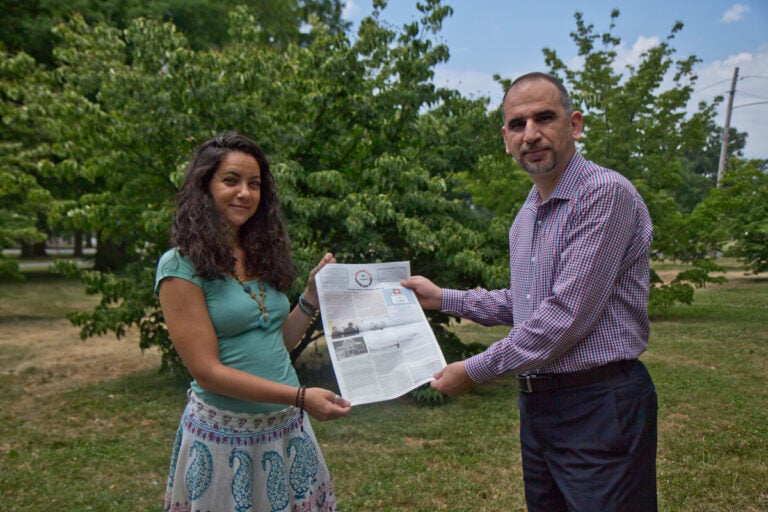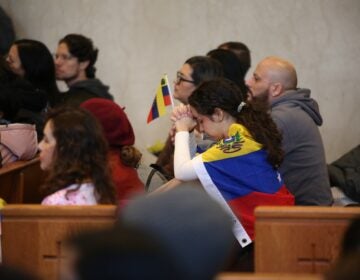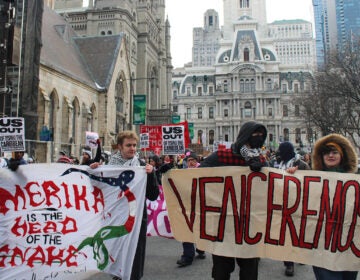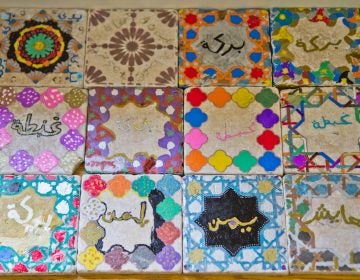Philly gets first Arabic newspaper in 118 years thanks to ‘Friends, Peace, and Sanctuary’
The collaborators behind the Friends, Peace, and Sanctuary Journal distributed 2,500 copies of the paper’s first quarterly across Philadelphia in May.

Nora Elmarzouky (left) and Yaroub Al-Obaidi (right) are the editors of the Friends, Peace, Sanctuary Journal, the first Arabic newspaper in Philadelphia in over 100 years. (Kimberly Paynter/WHYY)
Philadelphia became home to Al-Hoda, one of America’s longest-running Arabic newspapers, in 1898, which focused on longform essays. Inspired by that legacy, and the fact it’s an election and census year, a group of community members are bringing an Arabic quarterly journal to the city once again.
The writers hope to create a space for Arabic voices and build a sense of belonging by placing copies of the paper in popular places like grocery stores. Nora Elmarzouky, one of the two main editors of the newly founded Friends, Peace, and Sanctuary Journal, says it’s also about “increasing empathy.”
“As people begin to see more Arabic in our public spaces, the more we can recognize that we are a critical part of this community and society as well,” said Elmarzouky.
Elmarzouky said while mosques and organizations like Al-Bustan Seeds of Culture offer spaces for Arabic-speaking residents to gather, much of the communication within the community is done through Facebook. Editors hope the paper can offer a more formal space.
Working around social distancing restrictions during the COVID-19 pandemic, Elmarzouky and 16 other collaborators printed and distributed 2,500 copies of the paper’s first quarterly across Philadelphia in May.
The Spring Edition featured critical information on timely topics, such as the 2020 U.S. Census and the coronavirus. There was also an introduction to the paper from the chief editors, Elmarzouky and Yaroub Al-Obaidi, and the story of how the paper got started.
The pair had just finished working on a two-year collaboration also called “Friends, Peace, and Sanctuary.” With a grant from the Pew Center for Arts and Heritage, Swarthmore College connected Iraqis and Syrians in Philadelphia who had been displaced from their home countries, and invited participants to make art that explored themes of displacement and immigration.
Elmarzouky and Al-Obaidi took part in the program.
As the project wrapped up, Al-Obaidi said participants wanted to stay in touch and the idea of a newspaper came up.
The idea was for it “to be a forum for Arabic community and also engage with the people who like to learn Arabic, who like to engage with Arabic culture, Arabic food — everything related to our community in Philadelphia,” he said.
The paper’s first edition exemplifies the balance the group is trying to strike. In addition to calls for readers to become more civically engaged, there are recipes, including one for kibbeh, along with background on the popular Middle Eastern dish.
It’s a different approach from Al-Hoda’s, which was founded by Naoum Antoun Mokarzal who moved the paper to New York City in 1902 and dedicated many of its pages to Lebanese and Syrian politics.
Al-Obaidi said this paper would stay away from politics in an effort to “bring people together,” but the goal to connect Arabic-speakers remains the same.
For the Friends, Peace and Sanctuary Journal, that’s through pieces like one on fasting and another on Arabic calligraphy, as well as an article on the difficulties of being an immigrant teen in the U.S. and navigating a new country and culture.
Al-Obaidi said the author offered tips on what families, communities and schools can do to help teenagers who are struggling.
“She just opened the window for this kind of discussion,” he said, “shared some information, some experience about how to deal with especially the female teenager during this time.”
The printing of the paper was paid for through community engagement grants, though Elmarzouky and Al-Obaidi hope to get businesses to sponsor the work with advertising, so contributors could receive some payment for their work.
For the Summer edition, Elmarzouky and Al-Obaidi also hope to have articles in English. Their goal is to eventually release new editions every month.
So far, said Elmarzouky, the feedback has been positive.
“One person even said, ‘I haven’t held a newspaper in Arabic for 10 years and it just felt good to hold that newspaper.’”

Get daily updates from WHYY News!
WHYY is your source for fact-based, in-depth journalism and information. As a nonprofit organization, we rely on financial support from readers like you. Please give today.





